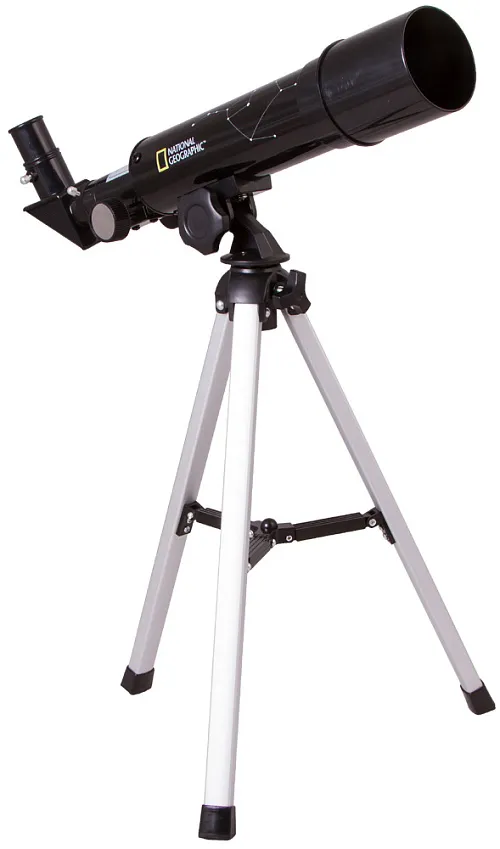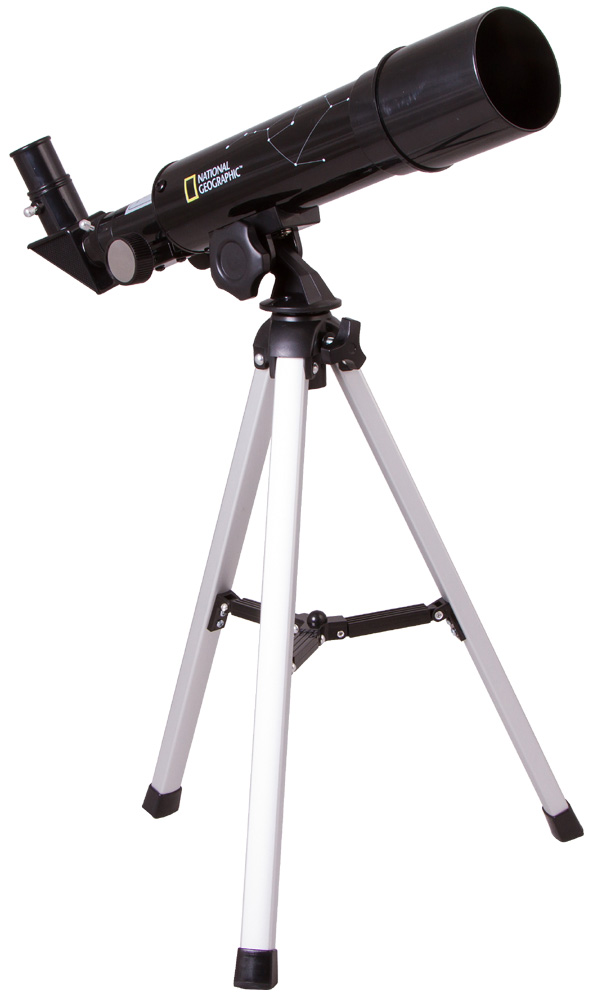Bresser National Geographic 50/360 AZ Telescope
Achromatic refractor. Objective lens diameter (aperture): 50mm. Focal length: 360mm
Refractor
Optical design
50
Aperture – the diameter of the light-collecting lens (refractors and catadioptric) or mirror (reflectors) that the telescope uses to collect light
360
Focal length – the distance from the primary lens or mirror to the point at which the light is focused
| Product ID | 69378 |
| Brand | Bresser GmbH, Germany |
| Warranty | 2 years |
| EAN | 4007922003726 |
| Package size (LxWxH) | 10x44x21 cm |
| Shipping Weight | 1.08 kg |
Description
An ultra-compact travel telescope with coated optics, Bresser National Geographic 50/360 AZ can be conveniently stored in a small bag or backpack to take to observing sites. Alternatively, it can be installed on a windowsill or balcony of your apartment. The telescope is suitable for lunar, planetary, and terrestrial viewing. In good weather conditions, you will be able to see the International Space Station. The diagonal mirror provides direct images of observed objects allowing you to observe terrestrial objects. The telescope is easy to control and doesn’t require any special knowledge or skills.
Features:
- Suitable for beginners and kids
- Magnification 18–60x
- Simple alt-azimuth mount
- Compact and lightweight model
- Diagonal mirror included in the kit
The kit includes:
- Bresser National Geographic 50/360 AZ Telescope
- Alt-azimuth mount
- Aluminum tripod
- Eyepieces: 6mm, 20mm
- Diagonal mirror
- User manual
Specifications
| Product ID | 69378 |
| Brand | Bresser GmbH, Germany |
| Warranty | 2 years |
| EAN | 4007922003726 |
| Package size (LxWxH) | 10x44x21 cm |
| Shipping Weight | 1.08 kg |
| Optical design | refractor |
| Optical scheme | achromat |
| Objective lens diameter (aperture), mm | 50 |
| Focal length, mm | 360 |
| Eyepieces | 6mm, 20mm |
| Eyepiece barrel diameter, in | 0.96 |
| Tripod | aluminum |
| Accessory tray | ✓ |
| Telescope control | manual |
| Mount | alt-azimuth |
| User level | elementary, beginners |
| Observed object | planets of the Solar System |
Reviews
Telescope accessory installation diagrams (.pdf) (13.12.2019)
Convenient diagrams that describe how to install additional accessories on refractors and catadioptric telescopes
Convenient diagrams that describe how to install additional accessories on refractors and catadioptric telescopes
Levenhuk Telescope Assembly Guide (14.12.2019)
Find out how to assemble a telescope on an example of the Levenhuk Skyline 90x900 EQ telescope
Find out how to assemble a telescope on an example of the Levenhuk Skyline 90x900 EQ telescope
A quick guide for novice astronomers (16.12.2019)
This short guide will help you avoid typical mistakes and learn more about telescope and mounting types
This short guide will help you avoid typical mistakes and learn more about telescope and mounting types
A telescope: how to start observing (16.12.2019)
The basics of astronomical observations for beginners
The basics of astronomical observations for beginners
Frequently Asked Questions – Telescopes (20.04.2020)
In this article we have gathered answers to some of the most frequently asked questions about telescopes
In this article we have gathered answers to some of the most frequently asked questions about telescopes
Telescope Under a Microscope: How Does It Work? (18.05.2020)
How telescopes work?
How telescopes work?
First Steps in Astronomy Made Easy! (18.05.2020)
You can actually perform observations from your balcony!
You can actually perform observations from your balcony!
Beginner’s Short Guide to Telescopes (18.05.2020)
All about telescope sizes, types, magnification, and mounts
All about telescope sizes, types, magnification, and mounts
How to use a telescope (18.05.2020)
Learn how to set up and use the telescope properly
Learn how to set up and use the telescope properly
Astronomical observations in the city (18.05.2020)
Astronomy in light-polluted skies. Find out what you can observe in the city
Astronomy in light-polluted skies. Find out what you can observe in the city
Telescopes for children (19.05.2020)
Read an interesting comprehensive article on telescopes for little astronomers
Read an interesting comprehensive article on telescopes for little astronomers
Things you can see with a telescope based on its aperture (19.05.2020)
Celestial objects you can observe with telescopes of different apertures
Celestial objects you can observe with telescopes of different apertures
What can you see with a telescope (19.05.2020)
Colored and vivid images of galaxies, planets and star clusters entrance everyone who is fascinated by boundless space
Colored and vivid images of galaxies, planets and star clusters entrance everyone who is fascinated by boundless space
What is a refracting telescope? (20.05.2020)
Find an interesting review on the history of the changes to a refracting telescope
Find an interesting review on the history of the changes to a refracting telescope
How to choose a telescope (20.05.2020)
To make the process of choosing a telescope easier, we will tell you about the characteristics of the most popular types of telescopes today
To make the process of choosing a telescope easier, we will tell you about the characteristics of the most popular types of telescopes today
A short guide to refractor telescopes: choose your equipment wisely (20.05.2020)
Learn everything you need to know about refractor telescopes to make the right choice
Learn everything you need to know about refractor telescopes to make the right choice
Questions and Answers
Submit your question













